Unit 4 Jenny and Danny Come to China 单元课件(共88张PPT)
文档属性
| 名称 | Unit 4 Jenny and Danny Come to China 单元课件(共88张PPT) |  | |
| 格式 | zip | ||
| 文件大小 | 10.5MB | ||
| 资源类型 | 试卷 | ||
| 版本资源 | 冀教版(三年级起点) | ||
| 科目 | 英语 | ||
| 更新时间 | 2021-10-26 07:44:44 | ||
图片预览

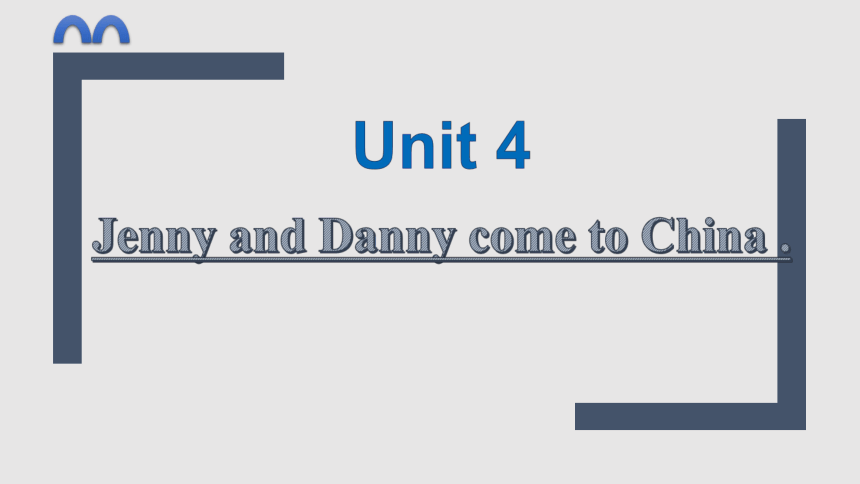
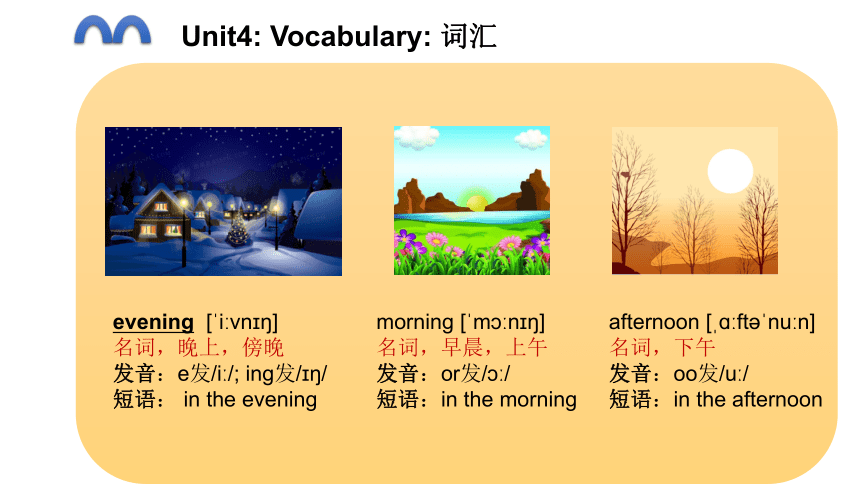
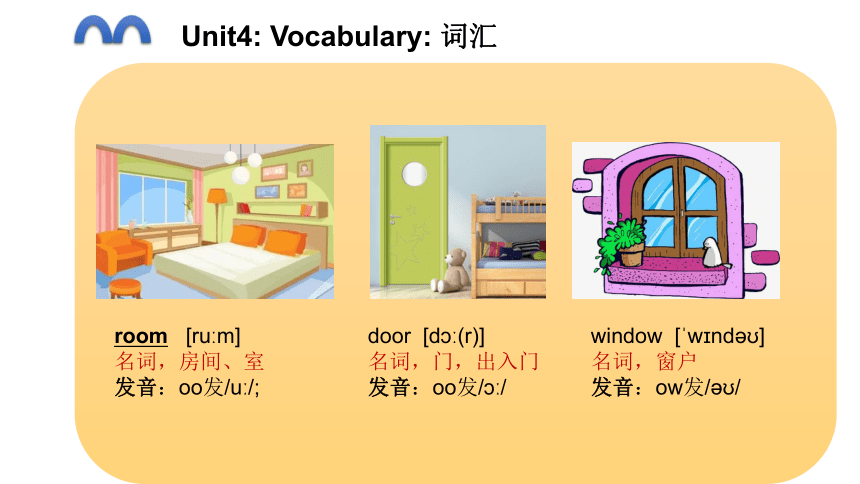
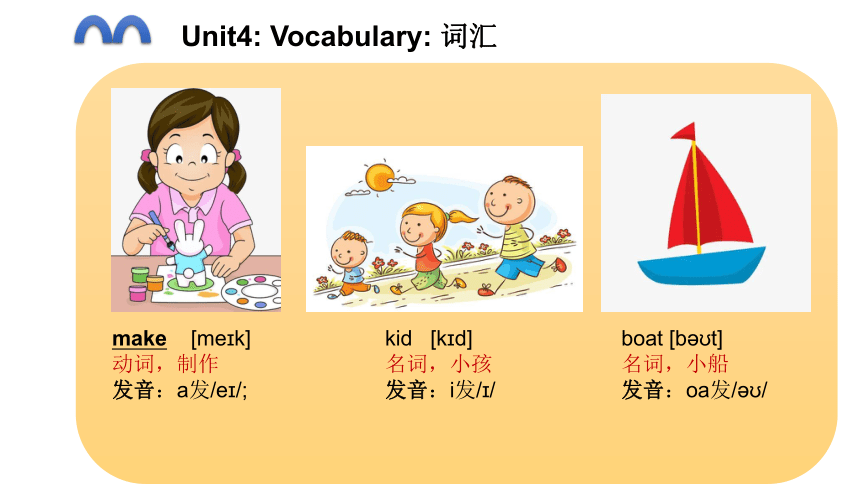
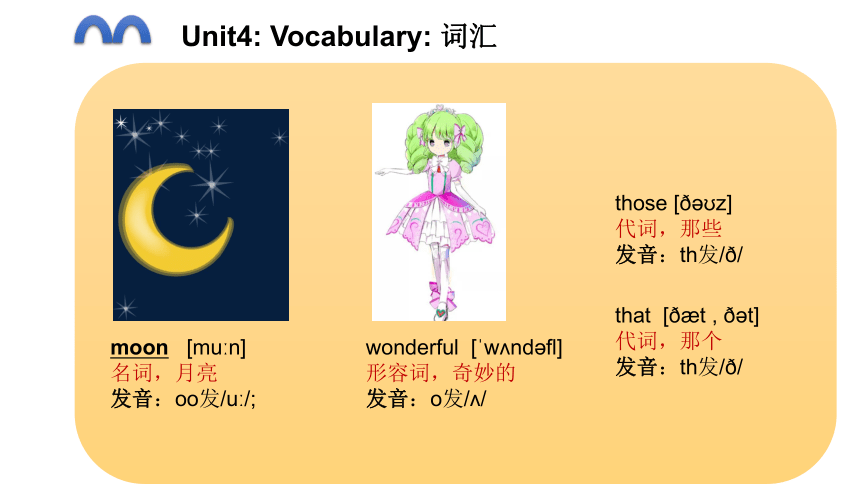
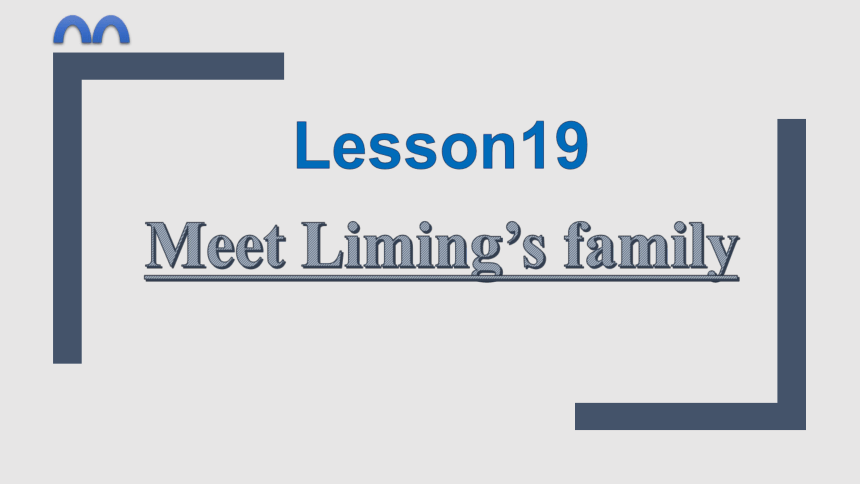
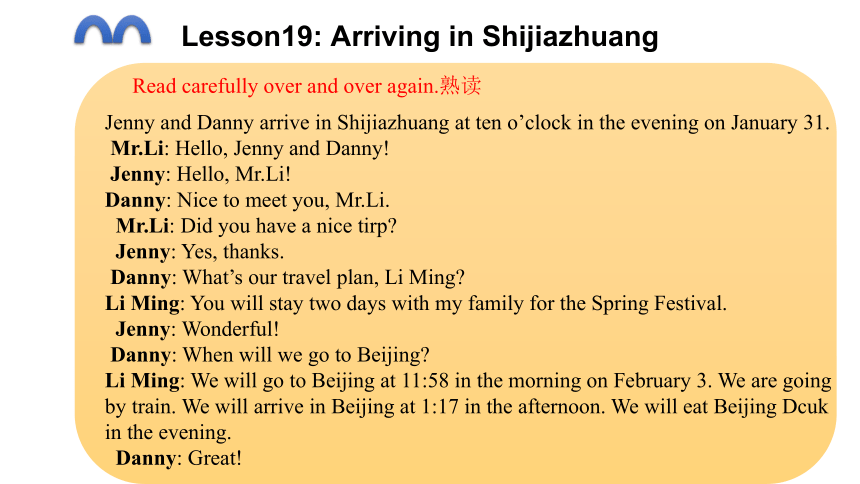
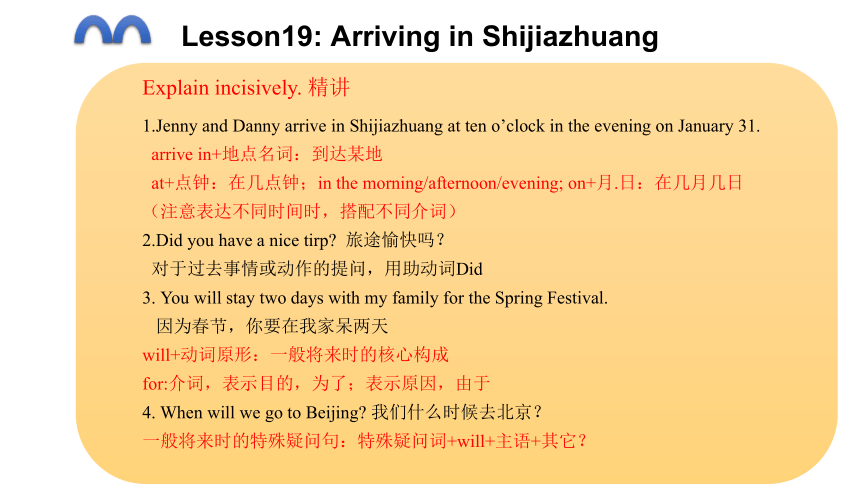
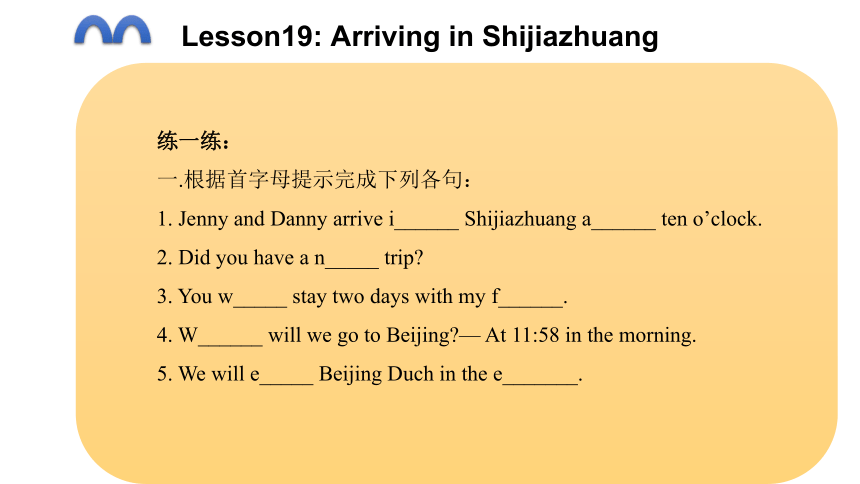
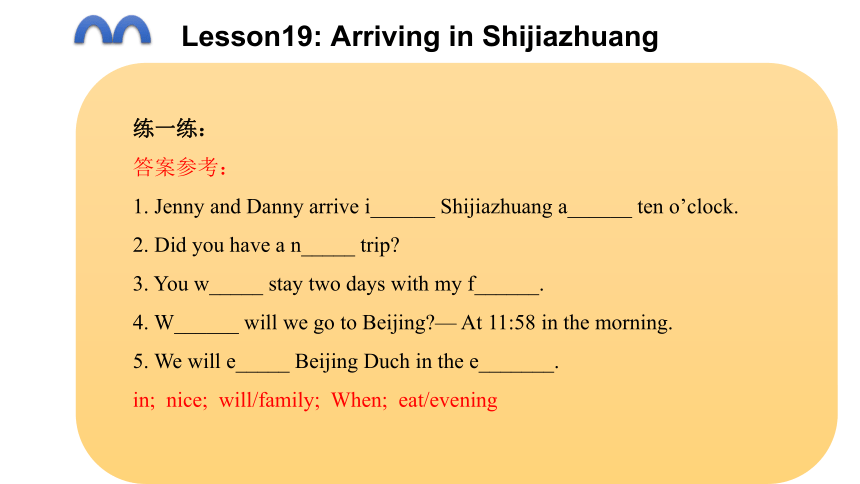
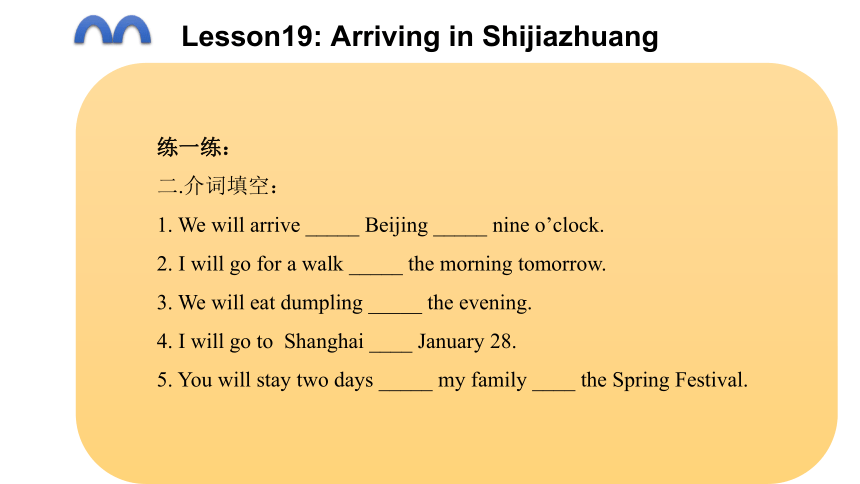
文档简介
(共88张PPT)
冀教版 五年级上
Unit 4
Jenny and Danny come to China .
Unit4: Vocabulary: 词汇
evening [ i vn ]
名词,晚上,傍晚
发音:e发/i /; ing发/ /
短语: in the evening
morning [ m n ]
名词,早晨,上午
发音:or发/ /
短语:in the morning
afternoon [ ɑ ft nu n]
名词,下午
发音:oo发/u /
短语:in the afternoon
Unit4: Vocabulary: 词汇
room [ru m]
名词,房间、室
发音:oo发/u /;
door [d (r)]
名词,门,出入门
发音:oo发/ /
window [ w nd ]
名词,窗户
发音:ow发/ /
Unit4: Vocabulary: 词汇
make [me k]
动词,制作
发音:a发/e /;
kid [k d]
名词,小孩
发音:i发/ /
boat [b t]
名词,小船
发音:oa发/ /
Unit4: Vocabulary: 词汇
moon [mu n]
名词,月亮
发音:oo发/u /;
wonderful [ w nd fl]
形容词,奇妙的
发音:o发/ /
those [ z]
代词,那些
发音:th发/ /
that [ t , t]
代词,那个
发音:th发/ /
Lesson19
Meet Liming’s family
Lesson19: Arriving in Shijiazhuang
Jenny and Danny arrive in Shijiazhuang at ten o’clock in the evening on January 31.
Mr.Li: Hello, Jenny and Danny!
Jenny: Hello, Mr.Li!
Danny: Nice to meet you, Mr.Li.
Mr.Li: Did you have a nice tirp
Jenny: Yes, thanks.
Danny: What’s our travel plan, Li Ming
Li Ming: You will stay two days with my family for the Spring Festival.
Jenny: Wonderful!
Danny: When will we go to Beijing
Li Ming: We will go to Beijing at 11:58 in the morning on February 3. We are going by train. We will arrive in Beijing at 1:17 in the afternoon. We will eat Beijing Dcuk in the evening.
Danny: Great!
Read carefully over and over again.熟读
Lesson19: Arriving in Shijiazhuang
Explain incisively. 精讲
1.Jenny and Danny arrive in Shijiazhuang at ten o’clock in the evening on January 31.
arrive in+地点名词:到达某地
at+点钟:在几点钟;in the morning/afternoon/evening; on+月.日:在几月几日
(注意表达不同时间时,搭配不同介词)
2.Did you have a nice tirp 旅途愉快吗?
对于过去事情或动作的提问,用助动词Did
3. You will stay two days with my family for the Spring Festival.
因为春节,你要在我家呆两天
will+动词原形:一般将来时的核心构成
for:介词,表示目的,为了;表示原因,由于
4. When will we go to Beijing 我们什么时候去北京?
一般将来时的特殊疑问句:特殊疑问词+will+主语+其它?
Lesson19: Arriving in Shijiazhuang
练一练:
一.根据首字母提示完成下列各句:
1. Jenny and Danny arrive i______ Shijiazhuang a______ ten o’clock.
2. Did you have a n_____ trip
3. You w_____ stay two days with my f______.
4. W______ will we go to Beijing — At 11:58 in the morning.
5. We will e_____ Beijing Duch in the e_______.
Lesson19: Arriving in Shijiazhuang
练一练:
答案参考:
1. Jenny and Danny arrive i______ Shijiazhuang a______ ten o’clock.
2. Did you have a n_____ trip
3. You w_____ stay two days with my f______.
4. W______ will we go to Beijing — At 11:58 in the morning.
5. We will e_____ Beijing Duch in the e_______.
in; nice; will/family; When; eat/evening
Lesson19: Arriving in Shijiazhuang
练一练:
二.介词填空:
1. We will arrive _____ Beijing _____ nine o’clock.
2. I will go for a walk _____ the morning tomorrow.
3. We will eat dumpling _____ the evening.
4. I will go to Shanghai ____ January 28.
5. You will stay two days _____ my family ____ the Spring Festival.
Lesson19: Arriving in Shijiazhuang
练一练:
答案参考:
1. We will arrive _____ Beijing _____ nine o’clock.
2. I will go for a walk _____ the morning tomorrow.
3. We will eat dumpling _____ the evening.
4. I will go to Shanghai ____ January 28.
5. You will stay two days _____ my family ____ the Spring Festival.
in at; in; in; on; with for
Lesson19 : Let’s do it!
Lesson19 : Let’s do it!
答案参考:
a: Yes, it is.
b: Two days.
c: They will go to Beijing at 11:58 in the morning on February 3.
d: They will go by train.
Lesson19 : Let’s do it!
Lesson19 : Let’s do it!
afternoon
evening
April 11
May 2
2:00
6:50
I will go to Lanzhou at 2:00 in the afternoon on April 11.
I will go to Shanghai at 6:50 in the evening on May 2.
Lesson19 :趁热打铁
给下列问句选择合适的答语:
( )1. Did you have a nice trip
( )2. When will you go to Beijing
( )3. How will you go to Shanghai
( )4. How many days will you stay in Beijing
B For two days.
C Yes, I did.
D At 3:00 in the afternoon.
A By plane.
Lesson19 :趁热打铁
答案参考:
( C )1. Did you have a nice trip
( D )2. When will you go to Beijing
( A )3. How will you go to Shanghai
( B )4. How many days will you stay in Beijing
B For two days.
C Yes, I did.
D At 3:00 in the afternoon.
A By plane.
Lesson19: Summary:总结
掌握介词用法:
点钟前面用介词 at;
上午下午晚上/ 年份、月份前面用 in
具体日期前用介词 on
掌握重要句型:
1.Jenny and Danny arrive in Shijiazhuang at ten o’clock in the evening on January 31.
2. You will stay two days with my family for the Spring Festival.
3. When will we go to Beijing — We will go to Beijing at 11:58 in the morning on February 3.
Lesson20
The Spring Festival is coming.
Lesson20: What do you do for the Spring Festival
关键讲解:
1. The Spring Festival is coming. 春节快要来了。
用现在进行时表示将来
2. What do you do for the Spring Festival 你为春节做了什么?
3. buy new clothes: 买新衣服
clean our rooms: 打扫房间
Lesson20: What do you do for the Spring Festival
Lesson20: What do you do for the Spring Festival
4.We also make dumplings. 我们也包饺子
also:副词,也,多用于肯定句句中
5.Me.too. 我也是
too:副词,也,多用于肯定句句末,且前面用逗号隔开。
6.visit our family and friends.
拜访亲朋好友
get lucky money
收到压岁钱
7. It’s on February 2 this year.
新年是今年的2月2日
Lesson20: What do you do for the Spring Festival
Lesson20 :趁热打铁
单项选择:
1. The Spring Festival ______.
A coming B come C is coming
2. What do you do _____ the Spring Festival
A in B on C for
3. We clean the doors, the windows and the ____.
A floors B a floor Cfloor
4. We ____ make dumplings.
A too B also C two
5. It’s on February 2 _____ year.
A that B this C those
Lesson20 :趁热打铁
答案解析:
1. The Spring Festival ______.
A coming B come C is coming
2. What do you do _____ the Spring Festival
A in B on C for
3. We clean the doors, the windows and the ____.
A floors B a floor Cfloor
4. We ____ make dumplings.
A too B also C two
5. It’s on February 2 _____ year.
A that B this C those
Lesson20: Let’s do it!
Lesson20: Let’s do it!
D
E
B
A
C
Lesson20: Let’s do it!
Lesson20 :趁热打铁
根据首字母提示完成句子:
1.We b_____ new clothes for the Spring Festival.
2. We also m______ dumplings on New year’s Eve.
3. I also v_____ our family during the Spring Festival.
4. I can g_____ lucky money.
5. We c______our rooms,doors and floor.
Lesson20 :趁热打铁
答案解析:
1.We b_____ new clothes for the Spring Festival.
2. We also m______ dumplings on New year’s Eve.
3. I also v_____ our family during the Spring Festival.
4. I can g_____ lucky money.
5. We c______our rooms,doors and floor.
buy; make; visit; get; clean
Lesson20: Summary:总结
掌握常见生活短语:
buy new clothes:买新衣 get lucky money: 收压岁钱
clean our rooms: 打扫房间 make dumplings: 包饺子
visit our family: 拜访家人
掌握常用句子:
1. The Spring Festival is coming. 春节要来了。
2. What do you do for the Spring Festival
你为春节做了什么?
Lesson21
What year is it
Lesson21: The twelve animals
Lesson21: The twelve animals
1. Each year has an animal name. 每年都有一个动物的名字。
each多修饰单数名词,做主语时,谓语动词用单数形式
2.The rat is the first. 老鼠是第一个。 first是序数词,表示“第一”,前面用定冠词the修饰。
Lesson21: The twelve animals
Lesson21: The twelve animals
3. How many animals are there 那里有多少只动物?
how many: 特殊疑问词,表示“多少”,对数量提问
4. The twelfth animal is a pig. 第十二个动物是猪。 twelve的序数词是twelfth
Lesson21: What is your year
Lesson21: What is your year
1.My year is the year of the rat.我的那年是鼠年。
the year of the rat: 鼠年 the year of the + 属相名词
2. There is no year of the cat. 没有猫年。
Lesson 21: 趁热打铁
单项选择:
Each year _____ an animal name.
A have B is C has
2. Here ____ a tiger.
A / B is C has
3. _____ animals are there — Twelve.
A How many B How much C How far
4. The _____ animal is a pig.
A twelve B twelfth C sixth
5. There is ____ year of the cat.
A no B not C /
Lesson 21: 趁热打铁
答案解析:
Each year _____ an animal name.
A have B is C has
2. Here ____ a tiger.
A / B is C has
3. _____ animals are there — Twelve.
A How many B How much C How far
4. The _____ animal is a pig.
A twelve B twelfth C sixth
5. There is ____ year of the cat.
A no B not C /
Lesson21: Let’s do it!
Lesson21: 随堂练习
一、按要求写句子:
1. How many animals are there in a year (答语)
______________________________
2. What’s your year (pig)
_______________________________
3. There is the year of the cat.(变否定句)
________________________________
Lesson21: 随堂练习
答案解析:
1. How many animals are there in a year (答语)
There are twelve animals in a year.
2. What’s your year (pig)
It’s the year of the pig.
3. There is the year of the cat.(变否定句)
There is no year of the cat.
Lesson 22
Special Holidays in China.
Lesson22: Holidays
Lesson22: Holidays
1.This evening ,Jenny and Danny will have a special dinner with Li Ming’s family. 今天晚上,Jenny和Danny将会和李明的家人吃一顿特殊的晚餐。
this evening多用于一般将来时的时间状语
2.What special holidays do you have in China 中国有什么特殊节日?
special holidays: 特殊节日
3.My favourite is the Spring Festival.我的最爱是春节。
4. We will have a big family dinner.
我们会吃一顿丰盛的家庭晚餐。
Lesson22: Holidays
Lesson22: Holidays
5. What do you do on the Dragon Boat Festival 端午节你们做什么?
传统节日前用介词on
6. have dragon boat races 赛龙舟
watch the moon 赏月
eat moon cakes 吃月饼
Lesson22: Let’s do it!
Lesson22: Let’s do it!
Lesson22: 随堂练习
单项选择:
1. Jenny and Danny ____ a special dinner with Li Ming’s family this evening.
A have B has C will have
2. We have many special _____.
A holidays B holiday C the holiday.
3. We _______ on the Mid-Autumn Festival.
A have drago boat races B eat zongzi C watch the moon
4. What do you do ____ the Dragon Boat Festival — Eat zongzi.
A in B on C for
Lesson22: 随堂练习
答案解析:
1. Jenny and Danny ____ a special dinner with Li Ming’s family this evening.
A have B has C will have
2. We have many special _____.
A holidays B holiday C the holiday.
3. We _______ on the Mid-Autumn Festival.
A have drago boat races B eat zongzi C watch the moon
4. What do you do ____ the Dragon Boat Festival — Eat zongzi.
A in B on C for
Lesson20: Summary:总结
掌握短语:
specail holidays: 特殊节日 have dragon boat races: 赛龙舟
have a big family dinner 一顿丰盛的家庭晚餐
this evening: 今天晚上 watch the moon: 赏月
on the Dragon Boat Festival: 在端午节
掌握常用句子:
1. What special holidays do you have in China
2. What do you do on the Dragon Boat Festival
3. We watch the moon and eat moon cakes on the Mid-Autumn Festival.
Lesson23
What do we need for the trip
Lesson23 : Let’s get ready!
Lesson23 : Let’s get ready!
01 Tomorrow we will go to Beijing . 明天我们要去北京
tomorrow:表达将来时态的时间状语,明天
将来时结构:主语+will+动词原形+其它+时间状语(时间状语可以放在前面,也可以放在后面)
02 We need train tickets from Shijiazhuang to Beijing.
我们需要从石家庄到北京的火车票。
train tickets: 火车票 from A to B:从A到B
Lesson23 : Let’s get ready!
Lesson23 : Let’s get ready!
3. I like these red trousers.
我喜欢这些红色的长裤
I don’t like those trousers. 我不喜欢那些裤子。
these的对应词是those
this对应词是that
I like的否定句是I don’t like
4.all done .准备好了/结束了
Lesson23 :趁热打铁
按要求写句子:
1.We go to Beijing today.(用tomorrow改句子)
______________________________
2. 我们需要从北京到上海的火车飞机票。(汉译英)
______________________________
3. I like these red trousers.(变否定句)
_______________________________
4. This is a blue sweater.(变复数)
_________________________________
Lesson23 :趁热打铁
答案解析:
1.We go to Beijing today.(用tomorrow改句子)
We will go to Beijing tomorrow.
2. 我们需要从北京到上海的火车飞机票。(汉译英)
We nee plane tickets from Beijing to Shanghai.
3. I like these red trousers.(变否定句)
I don’t like these red trousers.
4. This is a blue sweater.(变复数)
These are blue sweaters.
Lesson23: Let’s chant!
near: 近的 far:远的
this: 这个 that:那个 近的this,远的that
these 这些 those 那些
Lesson23: Let’s do it!
Lesson23: Letters and sounds
ow发 / / know [n ] slow [sl ]
oa发 / / coat [k t] boat [b t]
o发/ / nose[n z] home [h m]
Lesson23: Letters and sounds
练一练:选出下列划线部分发音不同的一项:
1.( ) A cow B know C slow
2.( ) A no B not C home
3.( ) A boat B mouse C coat
Lesson23: Letters and sounds
答案解析:选出下列划线部分发音不同的一项:
1.( A ) A cow B know C slow
2.( B ) A no B not C home
3.( B ) A boat B mouse C coat
Lesson23: Summary:总结
掌握句型:
一般将来时常用时间状语:tomorrow, this evening
一般将来时句子结构: 主语+will do sth.
We will go to Beijing Tomorrow.
We need train tickets from Shijiazhuang to Beijing.
I want to take my favourite clothes.
I like these red trousers.
I don’t like those trousers.
Lesson 24
Year animals.
Lesson24 : Story time
1.have a meeting 开会
2.tell:动词,讲,告诉
3 want to do sth :想做某事
4.name:动词,命名
5.ask +名词+to do sth: 让...做某事
6.everyone做主语,谓语动词用单数
7.on one’s way to 在去某地的路上
Lesson24 : Story time
arrive at+小地点:到达某地
in front of: 在...的前面
Lesson24 : Story time
Lesson24 : Story time
Lesson24 : Story time 趁热打铁
Talk and act:
1. Do you like the rat in the story Why or why not
_______________________________
2. Why cats always eat rats
________________________________
3. Which animal is the third
_________________________________
4. Which animal is the last
_________________________________
Lesson24 : Story time 趁热打铁
Talk and act:
1. Do you like the rat in the story Why or why not
Yes, I do. Because It’s interesting.
2. Why cats always eat rats
Because the cat is late for the rat.
3. Which animal is the third
The tiger.
4. Which animal is the last
The pig.
Lesson24 :课内练习 Read and write
Lesson24 :课内练习 Read and write
答案: at; in; on; At; in
Lesson24 :课内练习 Read and match
Lesson24 :课内练习 Read and match
2
6
3
4
1
5
Lesson24 :课内练习 Read and answer
Lesson24 :课内练习 Read and answer
is the year of the rat.
buy new clothes and clean the rooms.
the Spring Festival.
train tickets and clothes.
Lesson24 :课内练习 Complete the dialogue
Lesson24 :课内练习 Complete the dialogue
kids
morning
nice
afternoon
make
room
window
Lesson24 :课内练习 Read. Tick or cross
Lesson24 :课内练习 Read. Tick or cross
F
T
T
T
F
Thank you!
https://www.21cnjy.com/help/help_extract.php
冀教版 五年级上
Unit 4
Jenny and Danny come to China .
Unit4: Vocabulary: 词汇
evening [ i vn ]
名词,晚上,傍晚
发音:e发/i /; ing发/ /
短语: in the evening
morning [ m n ]
名词,早晨,上午
发音:or发/ /
短语:in the morning
afternoon [ ɑ ft nu n]
名词,下午
发音:oo发/u /
短语:in the afternoon
Unit4: Vocabulary: 词汇
room [ru m]
名词,房间、室
发音:oo发/u /;
door [d (r)]
名词,门,出入门
发音:oo发/ /
window [ w nd ]
名词,窗户
发音:ow发/ /
Unit4: Vocabulary: 词汇
make [me k]
动词,制作
发音:a发/e /;
kid [k d]
名词,小孩
发音:i发/ /
boat [b t]
名词,小船
发音:oa发/ /
Unit4: Vocabulary: 词汇
moon [mu n]
名词,月亮
发音:oo发/u /;
wonderful [ w nd fl]
形容词,奇妙的
发音:o发/ /
those [ z]
代词,那些
发音:th发/ /
that [ t , t]
代词,那个
发音:th发/ /
Lesson19
Meet Liming’s family
Lesson19: Arriving in Shijiazhuang
Jenny and Danny arrive in Shijiazhuang at ten o’clock in the evening on January 31.
Mr.Li: Hello, Jenny and Danny!
Jenny: Hello, Mr.Li!
Danny: Nice to meet you, Mr.Li.
Mr.Li: Did you have a nice tirp
Jenny: Yes, thanks.
Danny: What’s our travel plan, Li Ming
Li Ming: You will stay two days with my family for the Spring Festival.
Jenny: Wonderful!
Danny: When will we go to Beijing
Li Ming: We will go to Beijing at 11:58 in the morning on February 3. We are going by train. We will arrive in Beijing at 1:17 in the afternoon. We will eat Beijing Dcuk in the evening.
Danny: Great!
Read carefully over and over again.熟读
Lesson19: Arriving in Shijiazhuang
Explain incisively. 精讲
1.Jenny and Danny arrive in Shijiazhuang at ten o’clock in the evening on January 31.
arrive in+地点名词:到达某地
at+点钟:在几点钟;in the morning/afternoon/evening; on+月.日:在几月几日
(注意表达不同时间时,搭配不同介词)
2.Did you have a nice tirp 旅途愉快吗?
对于过去事情或动作的提问,用助动词Did
3. You will stay two days with my family for the Spring Festival.
因为春节,你要在我家呆两天
will+动词原形:一般将来时的核心构成
for:介词,表示目的,为了;表示原因,由于
4. When will we go to Beijing 我们什么时候去北京?
一般将来时的特殊疑问句:特殊疑问词+will+主语+其它?
Lesson19: Arriving in Shijiazhuang
练一练:
一.根据首字母提示完成下列各句:
1. Jenny and Danny arrive i______ Shijiazhuang a______ ten o’clock.
2. Did you have a n_____ trip
3. You w_____ stay two days with my f______.
4. W______ will we go to Beijing — At 11:58 in the morning.
5. We will e_____ Beijing Duch in the e_______.
Lesson19: Arriving in Shijiazhuang
练一练:
答案参考:
1. Jenny and Danny arrive i______ Shijiazhuang a______ ten o’clock.
2. Did you have a n_____ trip
3. You w_____ stay two days with my f______.
4. W______ will we go to Beijing — At 11:58 in the morning.
5. We will e_____ Beijing Duch in the e_______.
in; nice; will/family; When; eat/evening
Lesson19: Arriving in Shijiazhuang
练一练:
二.介词填空:
1. We will arrive _____ Beijing _____ nine o’clock.
2. I will go for a walk _____ the morning tomorrow.
3. We will eat dumpling _____ the evening.
4. I will go to Shanghai ____ January 28.
5. You will stay two days _____ my family ____ the Spring Festival.
Lesson19: Arriving in Shijiazhuang
练一练:
答案参考:
1. We will arrive _____ Beijing _____ nine o’clock.
2. I will go for a walk _____ the morning tomorrow.
3. We will eat dumpling _____ the evening.
4. I will go to Shanghai ____ January 28.
5. You will stay two days _____ my family ____ the Spring Festival.
in at; in; in; on; with for
Lesson19 : Let’s do it!
Lesson19 : Let’s do it!
答案参考:
a: Yes, it is.
b: Two days.
c: They will go to Beijing at 11:58 in the morning on February 3.
d: They will go by train.
Lesson19 : Let’s do it!
Lesson19 : Let’s do it!
afternoon
evening
April 11
May 2
2:00
6:50
I will go to Lanzhou at 2:00 in the afternoon on April 11.
I will go to Shanghai at 6:50 in the evening on May 2.
Lesson19 :趁热打铁
给下列问句选择合适的答语:
( )1. Did you have a nice trip
( )2. When will you go to Beijing
( )3. How will you go to Shanghai
( )4. How many days will you stay in Beijing
B For two days.
C Yes, I did.
D At 3:00 in the afternoon.
A By plane.
Lesson19 :趁热打铁
答案参考:
( C )1. Did you have a nice trip
( D )2. When will you go to Beijing
( A )3. How will you go to Shanghai
( B )4. How many days will you stay in Beijing
B For two days.
C Yes, I did.
D At 3:00 in the afternoon.
A By plane.
Lesson19: Summary:总结
掌握介词用法:
点钟前面用介词 at;
上午下午晚上/ 年份、月份前面用 in
具体日期前用介词 on
掌握重要句型:
1.Jenny and Danny arrive in Shijiazhuang at ten o’clock in the evening on January 31.
2. You will stay two days with my family for the Spring Festival.
3. When will we go to Beijing — We will go to Beijing at 11:58 in the morning on February 3.
Lesson20
The Spring Festival is coming.
Lesson20: What do you do for the Spring Festival
关键讲解:
1. The Spring Festival is coming. 春节快要来了。
用现在进行时表示将来
2. What do you do for the Spring Festival 你为春节做了什么?
3. buy new clothes: 买新衣服
clean our rooms: 打扫房间
Lesson20: What do you do for the Spring Festival
Lesson20: What do you do for the Spring Festival
4.We also make dumplings. 我们也包饺子
also:副词,也,多用于肯定句句中
5.Me.too. 我也是
too:副词,也,多用于肯定句句末,且前面用逗号隔开。
6.visit our family and friends.
拜访亲朋好友
get lucky money
收到压岁钱
7. It’s on February 2 this year.
新年是今年的2月2日
Lesson20: What do you do for the Spring Festival
Lesson20 :趁热打铁
单项选择:
1. The Spring Festival ______.
A coming B come C is coming
2. What do you do _____ the Spring Festival
A in B on C for
3. We clean the doors, the windows and the ____.
A floors B a floor Cfloor
4. We ____ make dumplings.
A too B also C two
5. It’s on February 2 _____ year.
A that B this C those
Lesson20 :趁热打铁
答案解析:
1. The Spring Festival ______.
A coming B come C is coming
2. What do you do _____ the Spring Festival
A in B on C for
3. We clean the doors, the windows and the ____.
A floors B a floor Cfloor
4. We ____ make dumplings.
A too B also C two
5. It’s on February 2 _____ year.
A that B this C those
Lesson20: Let’s do it!
Lesson20: Let’s do it!
D
E
B
A
C
Lesson20: Let’s do it!
Lesson20 :趁热打铁
根据首字母提示完成句子:
1.We b_____ new clothes for the Spring Festival.
2. We also m______ dumplings on New year’s Eve.
3. I also v_____ our family during the Spring Festival.
4. I can g_____ lucky money.
5. We c______our rooms,doors and floor.
Lesson20 :趁热打铁
答案解析:
1.We b_____ new clothes for the Spring Festival.
2. We also m______ dumplings on New year’s Eve.
3. I also v_____ our family during the Spring Festival.
4. I can g_____ lucky money.
5. We c______our rooms,doors and floor.
buy; make; visit; get; clean
Lesson20: Summary:总结
掌握常见生活短语:
buy new clothes:买新衣 get lucky money: 收压岁钱
clean our rooms: 打扫房间 make dumplings: 包饺子
visit our family: 拜访家人
掌握常用句子:
1. The Spring Festival is coming. 春节要来了。
2. What do you do for the Spring Festival
你为春节做了什么?
Lesson21
What year is it
Lesson21: The twelve animals
Lesson21: The twelve animals
1. Each year has an animal name. 每年都有一个动物的名字。
each多修饰单数名词,做主语时,谓语动词用单数形式
2.The rat is the first. 老鼠是第一个。 first是序数词,表示“第一”,前面用定冠词the修饰。
Lesson21: The twelve animals
Lesson21: The twelve animals
3. How many animals are there 那里有多少只动物?
how many: 特殊疑问词,表示“多少”,对数量提问
4. The twelfth animal is a pig. 第十二个动物是猪。 twelve的序数词是twelfth
Lesson21: What is your year
Lesson21: What is your year
1.My year is the year of the rat.我的那年是鼠年。
the year of the rat: 鼠年 the year of the + 属相名词
2. There is no year of the cat. 没有猫年。
Lesson 21: 趁热打铁
单项选择:
Each year _____ an animal name.
A have B is C has
2. Here ____ a tiger.
A / B is C has
3. _____ animals are there — Twelve.
A How many B How much C How far
4. The _____ animal is a pig.
A twelve B twelfth C sixth
5. There is ____ year of the cat.
A no B not C /
Lesson 21: 趁热打铁
答案解析:
Each year _____ an animal name.
A have B is C has
2. Here ____ a tiger.
A / B is C has
3. _____ animals are there — Twelve.
A How many B How much C How far
4. The _____ animal is a pig.
A twelve B twelfth C sixth
5. There is ____ year of the cat.
A no B not C /
Lesson21: Let’s do it!
Lesson21: 随堂练习
一、按要求写句子:
1. How many animals are there in a year (答语)
______________________________
2. What’s your year (pig)
_______________________________
3. There is the year of the cat.(变否定句)
________________________________
Lesson21: 随堂练习
答案解析:
1. How many animals are there in a year (答语)
There are twelve animals in a year.
2. What’s your year (pig)
It’s the year of the pig.
3. There is the year of the cat.(变否定句)
There is no year of the cat.
Lesson 22
Special Holidays in China.
Lesson22: Holidays
Lesson22: Holidays
1.This evening ,Jenny and Danny will have a special dinner with Li Ming’s family. 今天晚上,Jenny和Danny将会和李明的家人吃一顿特殊的晚餐。
this evening多用于一般将来时的时间状语
2.What special holidays do you have in China 中国有什么特殊节日?
special holidays: 特殊节日
3.My favourite is the Spring Festival.我的最爱是春节。
4. We will have a big family dinner.
我们会吃一顿丰盛的家庭晚餐。
Lesson22: Holidays
Lesson22: Holidays
5. What do you do on the Dragon Boat Festival 端午节你们做什么?
传统节日前用介词on
6. have dragon boat races 赛龙舟
watch the moon 赏月
eat moon cakes 吃月饼
Lesson22: Let’s do it!
Lesson22: Let’s do it!
Lesson22: 随堂练习
单项选择:
1. Jenny and Danny ____ a special dinner with Li Ming’s family this evening.
A have B has C will have
2. We have many special _____.
A holidays B holiday C the holiday.
3. We _______ on the Mid-Autumn Festival.
A have drago boat races B eat zongzi C watch the moon
4. What do you do ____ the Dragon Boat Festival — Eat zongzi.
A in B on C for
Lesson22: 随堂练习
答案解析:
1. Jenny and Danny ____ a special dinner with Li Ming’s family this evening.
A have B has C will have
2. We have many special _____.
A holidays B holiday C the holiday.
3. We _______ on the Mid-Autumn Festival.
A have drago boat races B eat zongzi C watch the moon
4. What do you do ____ the Dragon Boat Festival — Eat zongzi.
A in B on C for
Lesson20: Summary:总结
掌握短语:
specail holidays: 特殊节日 have dragon boat races: 赛龙舟
have a big family dinner 一顿丰盛的家庭晚餐
this evening: 今天晚上 watch the moon: 赏月
on the Dragon Boat Festival: 在端午节
掌握常用句子:
1. What special holidays do you have in China
2. What do you do on the Dragon Boat Festival
3. We watch the moon and eat moon cakes on the Mid-Autumn Festival.
Lesson23
What do we need for the trip
Lesson23 : Let’s get ready!
Lesson23 : Let’s get ready!
01 Tomorrow we will go to Beijing . 明天我们要去北京
tomorrow:表达将来时态的时间状语,明天
将来时结构:主语+will+动词原形+其它+时间状语(时间状语可以放在前面,也可以放在后面)
02 We need train tickets from Shijiazhuang to Beijing.
我们需要从石家庄到北京的火车票。
train tickets: 火车票 from A to B:从A到B
Lesson23 : Let’s get ready!
Lesson23 : Let’s get ready!
3. I like these red trousers.
我喜欢这些红色的长裤
I don’t like those trousers. 我不喜欢那些裤子。
these的对应词是those
this对应词是that
I like的否定句是I don’t like
4.all done .准备好了/结束了
Lesson23 :趁热打铁
按要求写句子:
1.We go to Beijing today.(用tomorrow改句子)
______________________________
2. 我们需要从北京到上海的火车飞机票。(汉译英)
______________________________
3. I like these red trousers.(变否定句)
_______________________________
4. This is a blue sweater.(变复数)
_________________________________
Lesson23 :趁热打铁
答案解析:
1.We go to Beijing today.(用tomorrow改句子)
We will go to Beijing tomorrow.
2. 我们需要从北京到上海的火车飞机票。(汉译英)
We nee plane tickets from Beijing to Shanghai.
3. I like these red trousers.(变否定句)
I don’t like these red trousers.
4. This is a blue sweater.(变复数)
These are blue sweaters.
Lesson23: Let’s chant!
near: 近的 far:远的
this: 这个 that:那个 近的this,远的that
these 这些 those 那些
Lesson23: Let’s do it!
Lesson23: Letters and sounds
ow发 / / know [n ] slow [sl ]
oa发 / / coat [k t] boat [b t]
o发/ / nose[n z] home [h m]
Lesson23: Letters and sounds
练一练:选出下列划线部分发音不同的一项:
1.( ) A cow B know C slow
2.( ) A no B not C home
3.( ) A boat B mouse C coat
Lesson23: Letters and sounds
答案解析:选出下列划线部分发音不同的一项:
1.( A ) A cow B know C slow
2.( B ) A no B not C home
3.( B ) A boat B mouse C coat
Lesson23: Summary:总结
掌握句型:
一般将来时常用时间状语:tomorrow, this evening
一般将来时句子结构: 主语+will do sth.
We will go to Beijing Tomorrow.
We need train tickets from Shijiazhuang to Beijing.
I want to take my favourite clothes.
I like these red trousers.
I don’t like those trousers.
Lesson 24
Year animals.
Lesson24 : Story time
1.have a meeting 开会
2.tell:动词,讲,告诉
3 want to do sth :想做某事
4.name:动词,命名
5.ask +名词+to do sth: 让...做某事
6.everyone做主语,谓语动词用单数
7.on one’s way to 在去某地的路上
Lesson24 : Story time
arrive at+小地点:到达某地
in front of: 在...的前面
Lesson24 : Story time
Lesson24 : Story time
Lesson24 : Story time 趁热打铁
Talk and act:
1. Do you like the rat in the story Why or why not
_______________________________
2. Why cats always eat rats
________________________________
3. Which animal is the third
_________________________________
4. Which animal is the last
_________________________________
Lesson24 : Story time 趁热打铁
Talk and act:
1. Do you like the rat in the story Why or why not
Yes, I do. Because It’s interesting.
2. Why cats always eat rats
Because the cat is late for the rat.
3. Which animal is the third
The tiger.
4. Which animal is the last
The pig.
Lesson24 :课内练习 Read and write
Lesson24 :课内练习 Read and write
答案: at; in; on; At; in
Lesson24 :课内练习 Read and match
Lesson24 :课内练习 Read and match
2
6
3
4
1
5
Lesson24 :课内练习 Read and answer
Lesson24 :课内练习 Read and answer
is the year of the rat.
buy new clothes and clean the rooms.
the Spring Festival.
train tickets and clothes.
Lesson24 :课内练习 Complete the dialogue
Lesson24 :课内练习 Complete the dialogue
kids
morning
nice
afternoon
make
room
window
Lesson24 :课内练习 Read. Tick or cross
Lesson24 :课内练习 Read. Tick or cross
F
T
T
T
F
Thank you!
https://www.21cnjy.com/help/help_extract.php
同课章节目录
- Unit 1 My family
- Lesson 1 Li Ming's Big Family
- Lesson 2 What Do They Look Like?
- Lesson 3 What Do They Do?
- Lesson 4 What Do They Like to Do?
- Lesson 5 Having Fun Togethe
- Lesson 6 Maddy's Famliy
- Unit 2 My Country and English-speaking Countries
- Lesson 7 China
- Lesson 8 Canada
- Lesson 9 The U.S
- Lesson 10 The U.K.
- Lesson 11 Australia
- Lesson 12 Maddy's Family Photos
- Unit 3 A Travel Plan
- Lesson 13 Beijing is Great
- Lesson 14 May I Go to Beijing ?
- Lesson 15 May I Invite Danny and Jenny?
- Lesson 16 How Can We Go To Beijing?
- Lesson 17 The Travel Plan
- Lesson 18 Billy Bee
- Unit 4 Jenny and Danny Come to China
- Lesson 19 Meet Li Ming's Family
- Lesson 20 The Spring Festival Is Coming!
- Lesson 21 What Year Is It?
- Lesson 22 Special Holidays in China
- Lesson 23 what do we need for the trip
- Lesson 24 Year Animals
